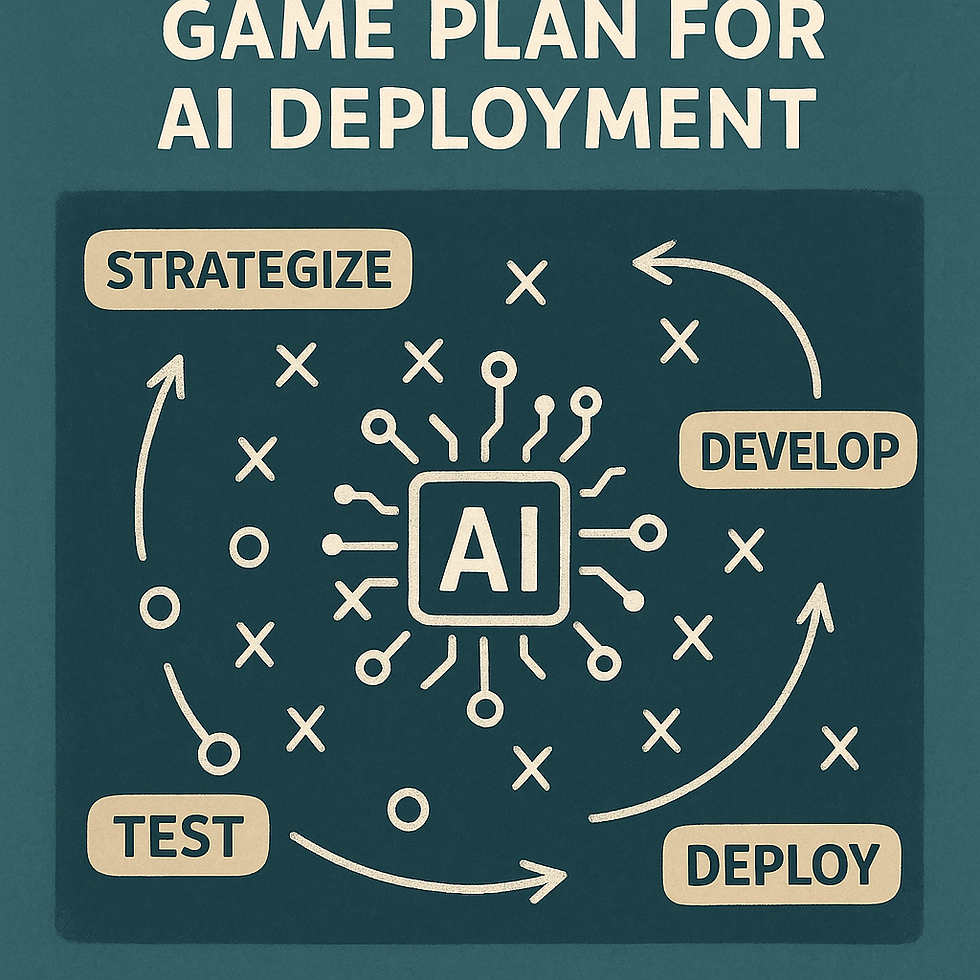How to select a consultant to build your customized AI agent
- Todd Jones
- Jul 1, 2025
- 4 min read

In today's AI-driven landscape, every organization—from scrappy startups to Fortune 500s—is exploring how intelligent agents can automate repetitive tasks, improve customer experience, and boost internal productivity. But building a powerful, reliable AI agent is not just about plugging into ChatGPT or tossing prompts into a black box.
It takes strategy, technical skill, and business alignment.
If you don’t have those resources in-house, hiring a consultant or AI development partner can be the fastest way to bring your vision to life. The challenge is: how do you choose the right consultant? Not just any developer who knows Python or prompt engineering—but someone who can bridge technology and real business impact.
In this post, we’ll walk you through what to look for, red flags to avoid, and how to evaluate AI consultants to build an agent that delivers value to your team from day one.
First, What Is an AI Agent?
Before we dive into hiring advice, let’s define the goal.
An AI agent is more than just a chatbot. It’s a system that can:
Interpret natural language prompts
Maintain memory and reasoning across conversations or steps
Integrate with APIs or tools to take action (calendar booking, emailing, data retrieval)
Make decisions using logic, policies, or goals
Examples include:
A personal scheduling assistant for each team member
An internal agent that queries your company knowledge base
A sales follow-up bot that connects with your CRM
A multi-agent workflow that completes multi-step business processes
These systems require more than prompt engineering—they often involve APIs, memory, retrieval (RAG), workflows, and security. That’s why selecting the right expert is critical.
Step 1: Know What You’re Building (and Why)
Before you even start talking to consultants, take time to define your use case and desired outcome. Ask:
What job should the agent do?
Who will use it—customers, employees, or both?
How will success be measured? (Time saved, increased conversions, reduced response times?)
What tools does it need to integrate with (Slack, Gmail, Google Calendar, databases, etc.)?
Even a high-level outline like “automate our client onboarding process via Slack” is a great starting point. Consultants who know what they’re doing will help refine and scope this further.
Step 2: Look for Hybrid Thinkers—Not Just Coders
The best AI consultants aren’t just engineers—they’re business-aware problem solvers.
They can:
Translate a vague idea into technical architecture
Recommend the right models, tools, and frameworks
Prioritize features based on real ROI
Build quick prototypes and iterate based on feedback
When vetting candidates, ask:
Have they worked on both front-end (UX/UI) and back-end (logic, data)?
Can they speak in non-technical terms when needed?
Do they understand automation, operations, or domain-specific workflows?
If their pitch is heavy on jargon and light on clarity, move on.
Step 3: Evaluate Their AI Stack and Tooling Knowledge
You’ll want someone who’s up to speed with today’s tools and can choose wisely based on your specific needs—not just the flashiest or newest tech.
Look for experience with:
Large Language Models: GPT-4, Claude, Gemini, Mistral, or fine-tuned open-source models
Agent Frameworks: LangChain, ReAct, CrewAI, AutoGen
Vector Databases: Pinecone, Weaviate, Supabase, Chroma
RAG & Memory: Retrieval-Augmented Generation, semantic search, persistent agent memory
Automation Tools: n8n, Zapier, Relevance AI, Airia AI
DevOps: APIs, authentication, deployment (cloud or local)
Don’t hesitate to ask what stack they’d propose and why. Good consultants tailor their choices based on cost, complexity, security, and scalability—not just buzzwords.
Step 4: Confirm They Can Integrate, Not Just Build
A common pitfall: hiring someone who builds a shiny agent, but it doesn’t connect to your systems.
Your consultant should be comfortable:
Integrating with Gmail, Slack, Google Calendar, Salesforce, Stripe, Notion, or whatever you use
Working with REST APIs or GraphQL
Building endpoints for input/output if needed
Setting up secure hosting or deploying on your preferred stack (AWS, Vercel, Docker, etc.)
Agents that live in silos offer limited business value. Integration is where they become useful.
Step 5: Ask About Security, Privacy, and Ownership
AI systems often deal with sensitive data—whether it’s customer support conversations, internal docs, or financial info. Your consultant should be upfront about how data is handled.
Make sure you clarify:
Who owns the final code and model configuration?
Where will data be stored? Is it encrypted?
Is the agent opt-out from training (especially if using GPT-4 via API)?
Will it support compliance needs like GDPR, SOC2, HIPAA?
If they hesitate or don’t have a clear answer, it’s a red flag.
Step 6: Start with a Discovery Phase or Small Project
Don’t jump straight into a multi-month contract. Any serious consultant will offer a discovery phase or MVP sprint first.
This might include:
Defining the architecture and data requirements
Building a working prototype
Choosing the right LLM and memory strategy
Demonstrating integrations
A small, paid test project gives you:
Proof of ability
Insight into their working style
A way to pivot without being locked into a long contract
Step 7: Watch for These Red Flags
They pitch AI like magic. There are limits—consultants should manage expectations.
They don’t ask about your business goals. Tech without purpose = wasted money.
They push one tool for every project. Good consultants adapt to the use case.
They can’t explain things simply. You need someone who can clarify, not confuse.
No post-launch support or optimization. Agents improve with use. Avoid one-and-done builders.
Final Questions to Ask Before Hiring
Here’s a quick checklist to bring into your vetting calls:
What is your process from idea to deployment?
Have you built similar agents before? Can I see examples?
What LLMs and frameworks do you recommend for this use case and why?
Can you integrate this with [your tools]?
How do you test and improve agent accuracy or output quality?
Do you offer ongoing maintenance or support?
Who owns the code and data when the project ends?
Conclusion: Think Partnership, Not Just Project
The right consultant is more than a contractor—they’re a partner in shaping how AI fits into your team’s workflow. They’ll help you avoid hype, focus on outcomes, and iterate toward something that saves time, scales knowledge, or drives value.
Choose someone who gets the tech, yes—but also gets you.
.png)




Comments